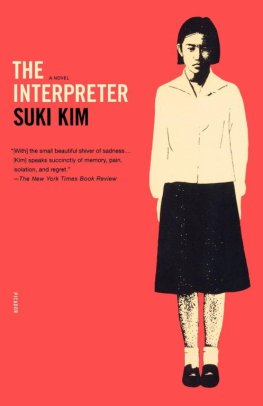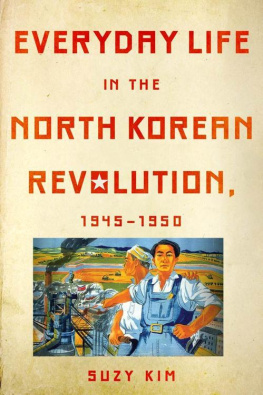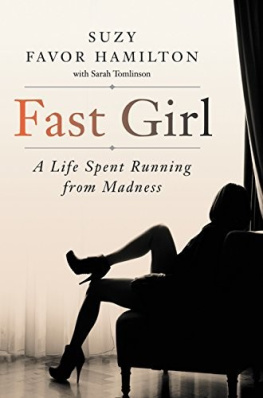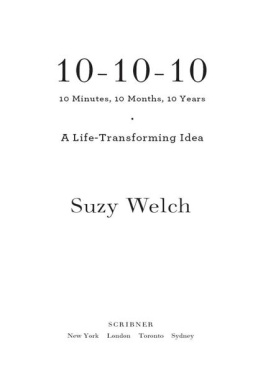Suki Kim - The Interpreter
Here you can read online Suki Kim - The Interpreter full text of the book (entire story) in english for free. Download pdf and epub, get meaning, cover and reviews about this ebook. City: New York, year: 2011, publisher: Picador, genre: Detective and thriller. Description of the work, (preface) as well as reviews are available. Best literature library LitArk.com created for fans of good reading and offers a wide selection of genres:
Romance novel
Science fiction
Adventure
Detective
Science
History
Home and family
Prose
Art
Politics
Computer
Non-fiction
Religion
Business
Children
Humor
Choose a favorite category and find really read worthwhile books. Enjoy immersion in the world of imagination, feel the emotions of the characters or learn something new for yourself, make an fascinating discovery.
- Book:The Interpreter
- Author:
- Publisher:Picador
- Genre:
- Year:2011
- City:New York
- ISBN:0-312-42224-5
- Rating:3 / 5
- Favourites:Add to favourites
- Your mark:
- 60
- 1
- 2
- 3
- 4
- 5
The Interpreter: summary, description and annotation
We offer to read an annotation, description, summary or preface (depends on what the author of the book "The Interpreter" wrote himself). If you haven't found the necessary information about the book — write in the comments, we will try to find it.
Suki Kim: author's other books
Who wrote The Interpreter? Find out the surname, the name of the author of the book and a list of all author's works by series.
The Interpreter — read online for free the complete book (whole text) full work
Below is the text of the book, divided by pages. System saving the place of the last page read, allows you to conveniently read the book "The Interpreter" online for free, without having to search again every time where you left off. Put a bookmark, and you can go to the page where you finished reading at any time.
Font size:
Interval:
Bookmark:
Suki Kim
THE INTERPRETER
For my parents
1.
CIGARETTE AT 9 A.M. is a sure sign of desperation. Doesnt happen to her often, except on mornings like this, November, rain, overcrowded McDonalds in the South Bronx off the 6 train. Like a block party, this place, with those dopey eight-year-olds who should be in school, and their single mothers sick of shouting, and the bored men at each table still not at work. Morning is full here. Everyones in it together, a communal experience, this day, this life. It is not her life, though. She does not know this. She does not want this. She looks up, instead, at a huge sign for the breakfast special across the window. Not much mystery there, food is plenty. Ninety-nine cents for hash browns, an English muffin with microwaved egg yolks, and a miniature Tropicana. Too good to be true, such abundance for barely a dollar. This is a generous neighborhood.
She is twenty-nine, and it is November. She is overdressed, as usual. The black cashmere coat that costs double her rent, and the pin-striped pants are sleek enough for any Hollywood starlet. Across her shoulder is a navy tote bag that matches the steel shine of her leather boots. Her face bears no trace of makeup. She is morose in black and blue. These are power colors.
November, and she stands facing the entrance of McDonalds on Burnside Avenue. In her left hand is a black vinyl umbrella, and in her right, a half-smoked cigarette she barely sucks on. Five minutes past nine. She is too early. The subway was unexpectedly fast. Only when she is running ahead of schedule should this happen, should the local suddenly reroute to express and drop her off at the Bronx stop within minutes. Fifty-five minutes to hang outside McDonalds in this part of town, a world away from her apartment back in downtown Manhattan. Fifty-four minutes and counting; she is stuck in this wilderness and peeks at her watch again.
But a rescue is handy, a cup of fresh coffee, a slab of butter on a toasted muffin. All she has to do is walk through that door and wave a dollar. A long drag on a cigarette, longer than necessary. She is stalling. She has not yet bought into this place.
Rain keeps on, halfhearted, barely soaking. She is Cinderella-at-midnight, and her chic ensemble a pumpkin dream ready to pop. There is no glass slipper in this part of town, no Prince Charming in search of a princess. The crossover is final. Beyond that door is the wrong track, whose morning begins with a dollar and a jaded appetite.
Looking in is easy, to stand out in rain and take note of what unfurls from a distance.
Instead, she is inside now. There are several lines, which all reach several faces taking orders. The line in which she stands moves fast enough, but she has time, enough time to stand and wait. Oh, but time is plenty here. People sit around in all corners. No one dashes out to a merger meeting at the head office. No one screams double espresso with a touch of skim milk. No one fumbles with a tray balancing a Motorola on their right ear. None of that happens here. This is a place of leisure. Shes in no rush.
What do you want after all, do you want me to tell you? Damian had lunged at her in his final message, as if he were pushing himself into her once more.
What do you want, miss?
She did not hear the man the first time. Such mishaps keep happening to her lately. She keeps missing the cue. She sets an alarm for eight and bolts out of bed at seven, or she presses 3 in the elevator and finds herself on the second floor, or she runs to answer the phone only to realize it is not ringing. Here she is dumbstruck before a man in a brown uniform who is shaking his head now, repeating for the third time, What do you want, miss?
Coffee, a medium-sized cup of coffee, please. She thought she had said it. She thought he knew what she wanted. The big-haired teenager behind her is popping her pink gum, visibly annoyed. The man in the brown uniform snatches the dollar from her, shaking his head once more. The coffee costs seventy-nine cents. Twenty more cents, she could have a complete breakfast; whats she thinking? She can sense the mans disapproval. Bitch, he must think. A cup of coffee for seventy-nine cents when a whole tray comes for a dollar, Miss Too-Good-for-a-Discounted-Meal, Miss Stuck-Up-Coat, Miss Cant-Hear-for-Shit!
Bitch it is, this 9 a.m. Marlboro high. She needs to sit down, but the place is jam-packed, and no one is leaving anytime soon. But a miracle, it must be. There is someone waving at her, pointing at the empty seat across from him. Once she plops herself down and takes a hot sip of coffee, she notices that the man is in fact the only other Asian present.
He is reading the paper. Hangukilbothe Korea Dailyshe recognizes the bold type. Beneath the thick Walgreens reading lenses, his eyes appear puffy and reddish. Lacking a good nights sleep, she thinks. They all do, these immigrant men. He wiggles his nose, which is too small for his spacious face, before glancing up at her for a second. She smiles, grateful for the seat. He does not return the smile but continues to stare at her awhile before turning back to his paper. He knows, she thinks. They always do. Its one of those things, the unspoken recognition among the same kind. She can tell whos Korean from miles away. Of course, shes been wrong before, though only a handful of times, mistaking a Japanese person for Korean. She is not sure why, perhaps something in the history, a possible side effect of the sick affinity between the colonizer and the colonizedJapan had once ruled Korea for thirty-six years, her father never forgot to remind her. Or it might simply be the way their facial bones are shaped, Koreans and Japanese more oval while Chinese seem flatter. All she knows is that she can always tell, and he can tell, and they both know that they are the same kind, sitting so close amidst a roomful of the rest of the world.
He is not interested in conversation, and she is glad. He does not harangue her with Were you born in the States?, What do your parents do?, or Why is a good Korean girl like you not yet married?the prying questions that fellow immigrants often feel entitled to ask. Buried behind his newspaper now, he is no longer visible to her. Its almost noble of him, she thinks, to offer her a seat and leave her alone.
Nothing comes for free, look closer, you always find a tag, Damian had whispered into her ear while pulling at the last button on her dress. Then he took five steps backward and stood gazing at her first nakedness as if he were an artist before a muse. His eyes had appeared awfully blue then, bluer than they justifiably were, almost aqua, the ocean color, so different from her own black eyes that she looked away in a sudden wave of embarrassment, thinking the whole time, Even this has a price, even his lips on my skin, even his bluest eyes on me.
Rain this morning is an accomplice. Even at the edge of the city through a cloudy window across which hangs a ninety-nine-cent-breakfast banner. The coffee is cooling. The waiting is not so bad after all. This might be her break. No one will find her here. A perfect hideout.
Then the man across from her shuts his newspaper. He picks up his tray without meeting her eyes. She watches him walk away. It is the shrunken walk of one who had once been a young man but is no longer, who has not spoken his language for longer than he can bear, who no longer believes that he will ever see his homeland. She can feel the weight of each step. She wants to look away. Yet she is relieved when he stops outside and lights a cigarette under the orange awning.
He is not gone. He is not yet gone from her. He stands with his back turned to the window, which she is facing now. The back of his hair is thinning. He is older than his actual age, perhaps. She notes the wrinkled seams of his gabardine pants and the shiny leather of his dress shoes, which are long out of style. He is awkward in his clothes, she thinks. Those are not his everyday shoes. When was the last time he put those shoes on, what was he like then, what was the rest of his life? But this is a terrible habit, to wonder upon a past, to dig into a history of anything, anyone, even a passing stranger at a fast-food joint in a neighborhood that is not hers. A lack of reserve, or boundary. Yet she still cannot look away. She knows men like him. She imagines how he might have fumbled through the back of his closet to pull out those black leather shoes, which might have sat in the dirt of his buried past for as long as a decade, or even longer, depending on when he had moved to this country, and how he might have shined them all morning with a bit of paper towel and wax, thinking to himself, Ah they are fine still, they fit still, I am not such an old man after all, this mute delivery guy from Queens whom no one ever looks at, including my own wife, who hasnt had a day of smiles since she made that bad slip of following me so far, as far as this McDonalds land in the middle of nowhere, to this bad-food, bad-mannered country where I am nothing but a frail old man, smoking the last butt of a Marlboro in the November rain, as if my life depended on it, as if this life were a thing I could have known when I last wore these shoes.
Font size:
Interval:
Bookmark:
Similar books «The Interpreter»
Look at similar books to The Interpreter. We have selected literature similar in name and meaning in the hope of providing readers with more options to find new, interesting, not yet read works.
Discussion, reviews of the book The Interpreter and just readers' own opinions. Leave your comments, write what you think about the work, its meaning or the main characters. Specify what exactly you liked and what you didn't like, and why you think so.











